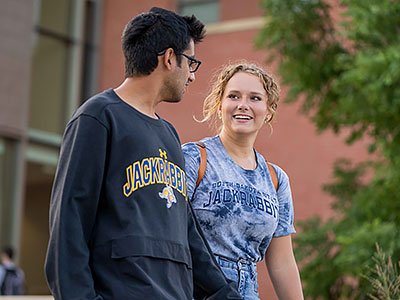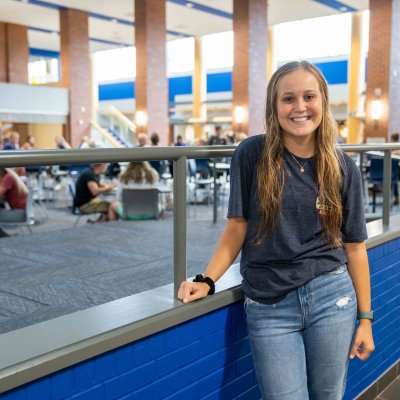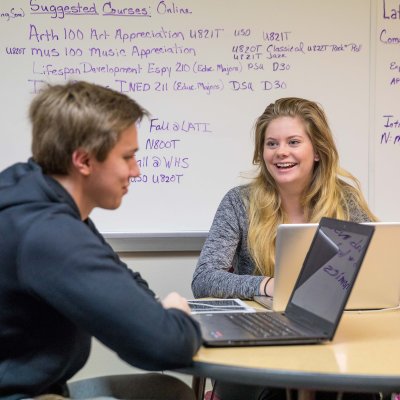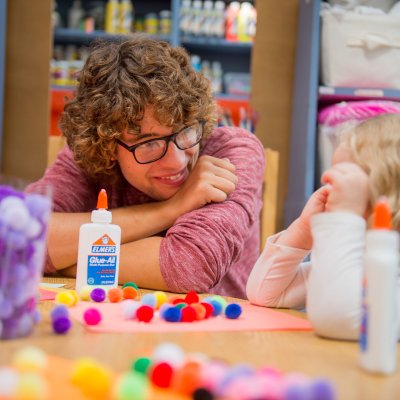SDState High School Dual Credit
Dual credit is an opportunity for eligible high school juniors and seniors to enroll in courses at SDSU and earn credits toward their post-secondary degree while completing their high school graduation requirements.
Getting Started
High school juniors and seniors within South Dakota are eligible to participate in the dual credit program if they meet any of the following requirements:
- High school junior eligible to enroll in a high school in South Dakota who meets one of the following requirements:
- earn an ACT composite score of 24 reflective of the 70% percentile; or
- rank in upper one-third of their graduating class; or
- earn a cumulative GPA of at least 3.50 on a 4.0 scale;
OR
- High school senior eligible to enroll in a high school in South Dakota who meets one of the following requirements:
- earn an ACT composite score of 21 reflective of the 50% percentile; or
- rank in the upper one-half of their graduating class; or
- earn a cumulative GPA of at least 3.25 on a 4.0 scale;
OR
- High School junior or senior eligible to enroll in a high school in South Dakota meeting Undergraduate admissions requirements:
- ACT score of 18 (or 21 for USD and SDSM&T); and
- Successful completion of coursework Requirements:
- Four Years of English
- Three years of advanced mathematics
- Three years of laboratory science
- Three years of social studies
- One year of fine arts
OR
- High School junior or senior eligible to enroll in a high school in South Dakota who meet the benchmark scores on one of the assessments listed below:
- Smarter Balanced – Score Level 3 or higher on the English Language Arts AND Mathematics 11th Grade Assessments.
- PreACT Exam Composite Score of 24 or higher
- ACCUPLACER Next Generation (QAS - Score 255 or higher AND Writing Score 263 or higher)
Note: Home-schooled students must meet ACT requirements or #4 requirements
* Please visit the Academic Testing Center for more information about the Accuplacer or to schedule an appointment to take the exam.
How Do I Apply?
First-time students should create an account with a personal email address
Continuing students will log in with their university-provided email address and password.

Dual Credit Cost
Dual credit coursework is available to qualified high school students in grades 11-12 at the rate of $50.85* per credit, plus any required textbooks or related course materials. That compares to about $300 per credit for non-high school students currently attending SDSU.
*Subject to change
Course Planning
Students wishing to take Math or English courses must meet the ACT requirements or successfully complete a placement exam. Refer to the links below for placement tables:
If a student has not taken the ACT, the College Board Accuplacer is then used to determine their placement into English 101 or Math 114. Please visit the Academic Testing Center for more information about the Accuplacer or to schedule an appointment to take the exam.
Elective Credits are college credits applied to graduation and account for any courses 100-level and above that do not meet a specific (general education, major, college, etc.) graduation requirement.
Major or Program Credits are the college courses that are required of the particular major or program the student intends to complete. These courses typically fall within the major or field of study, with the number of credits required determined by that major or program.
System General Education Requirements (SGRs) are courses approved by the South Dakota Board of Regents (SD BOR) to impart common knowledge and intellectual concepts to students and to develop in them the skills and attitudes that an organization’s faculty believe every educated person should possess. All students completing an undergraduate degree through a SD BOR institution must successfully complete coursework to fulfill the identified general education goals in written communication, oral communication, social sciences, arts and humanities, mathematics, natural sciences.
What typically fulfills the requirements for an undergraduate degree at South Dakota State University?
Most undergraduate programs require a student to complete a minimum of 120 credits at the 100 course level or above. Some programs (i.e., engineering) require a minimum of 130 credits. Students will complete approximately 30 credits in system general education and institutional graduation requirements. Many academic programs require at least 63 credits in major or program requirements. Please note that this number varies by academic program; careful understanding and planning of major or program requirements is necessary. Programs vary greatly in the amount of elective coursework with an average of about 27 credits; this provides students an opportunity to explore other fields of study and interests and to add a minor or even a second major. The chart illustrates how credits are typically distributed within an undergraduate degree.
A large number of incoming credits does not in itself guarantee a shorter path to a degree!
The curricular requirements of many programs are linked to the requirements and standards of professional accreditation. How (and whether) a student’s credits apply to degree requirements will determine the student’s time to degree. Although credits from this dual credit program will count at SDSU (transfer of credits outside the SDBOR; including Technical Institutes are subject to established transfer polices), those credits may not help to fulfill the particular requirements for a specific degree. For example, though a student may earn a substantial number of credits in a foreign language by satisfactory completion of the language placement test (and though satisfactory testing and the resulting credits in a foreign language certainly represent an admirable level of academic achievement), those credits will not significantly advance progress toward a degree if the student’s program does not require 1) foreign language proficiency and/or 2) elective course work.
What General Education courses should I take?
Based on the student’s desired area of study, SDSU has identified five options that will guide them in choosing the courses that will help them get started on their chosen academic path.
Majors in this option offer a wide range of degree programs aimed at preparing graduates to meet the many challenges of feeding and sustaining a rapidly growing global population.
Examples of careers in this option include:
| Careers | |
|---|---|
|
|
The list of majors in this option can be viewed below. Find advising guidesheets.
| Majors | |
|---|---|
|
|
Suggested general education courses
If the student is considering a major in this option, the following general education courses are suggested.
Note that general education courses vary by academic program. Consult the advising guide regarding the program of interest, talk with a high school guidance counselor, or contact Continuing and Distance Education by email or at 605-688-4154 to determine which courses would be the best fit.
| System General Education Requirements (SGRS) | Courses |
|---|---|
| SGR Goal 1 Written Communication | ENGL 101 Composition I**; and ENGL 201 Composition II |
| SGR Goal 2 Oral Communication | CMST 101 Foundations of Communication |
| SGR Goal 3 Social Sciences | Student Choice |
| SGR Goal 4 Arts and Humanities | Student Choice |
| SGR Goal 5 Mathematics | MATH 114 College Algebra** |
| SGR Goal 6 Natural Sciences | BIOL 101/101L Biology Survey I and Lab; or BIOL 151/151L General Biology I and Lab; CHEM 106/106L Chemistry Survey and Lab; or CHEM 112/112L General Chemistry I and Lab; GEOG 131/131L Physical Geography: Weather and Climate and Lab; or GEOG 132/132L Physical Geography: Natural Landscapes and Lab; PHYS 101/101L Survey of Physics and Lab; or PHYS 111/111L Introduction to Physics I and Lab |
** Enrollment based on placement
Majors in this option offer a wide range of degree programs aimed at preparing graduates to meet the many challenges of feeding and sustaining a rapidly growing global population.
Examples of careers in this option include:
- soil conservationist
- wildlife biologist
- dairy product development specialist
- biotechnologist
- livestock nutritionist
- forensic scientist
- applied research and product development
- drug discovery
The list of majors in this option can be viewed below. Find advising guidesheets.
| Majors | |
|---|---|
|
|
Suggested general education courses
If the student is considering a major in this option, the following general education courses are suggested.
Note that general education courses vary by academic program. Consult the advising guide regarding the program of interest, talk with a high school guidance counselor, or contact Continuing and Distance Education by email or at 605-688-4154 to determine which courses would be the best fit.
| System General Education Requirements (SGRS) | Courses |
|---|---|
| SGR Goal 1 Written Communication | ENGL 101 Composition I**; and ENGL 201 Composition II |
| SGR Goal 2 Oral Communication | CMST 101 Foundations of Communication |
| SGR Goal 3 Social Sciences Economics/Business Focus Teacher Education Focus Social Sciences Focus | ECON 201 Principles of Microeconomics; or ECON 202 Principles of Macroeconomics HDFS 210 Lifespan Development PSYC 101 General Psychology; or SOC 100 Introduction to Sociology; or POLS 100 American Government; or GLST 201 Global Studies I |
| SGR Goal 4 Arts and Humanities | Student Choice |
| SGR Goal 5 Mathematics | MATH 114 College Algebra** |
| SGR Goal 6 Natural Sciences | Student Choice |
** Enrollment based on placement
Ready for a rewarding career in science, technology, engineering or mathematics (STEM)? We prepare our students for the future through a rigorous, practical education focused on problem-solving in one of many STEM majors.
Students can also enhance their degree with many options for real-life work experience right here in Brookings or nearby. Most of our students complete part-time work in their major before graduation at nearby engineering and manufacturing companies who are eager to hire our students and graduates.
Examples of careers in this option include:
- Mechanical Engineer
- Electrical Engineer
- Civil Engineer
- Agricultural and Biosystems Engineer
- Software Engineer
- Computer Programmer
- Data Scientist
- Actuary
- Electronic Engineering Technician
- Operations Manager
- Construction Manager
- Precision Agriculture Technician
The list of majors in this option can be viewed below. Find advising guidesheets.
- Agricultural and Biosystems Engineering
- Civil Engineering
- Computer Science
- Construction Management
- Data Science
- Electrical Engineering
- Electronics Engineering Technology
- Operations Management
- Mathematics
- Mechanical Engineering
Suggested general education courses
If the student is considering a major in this option, the following general education courses are suggested.
Note that general education courses vary by academic program. Consult the advising guide regarding the program of interest, talk with a high school guidance counselor, or contact Continuing and Distance Education by email or at 605-688-4154 to determine which courses would be the best fit.
| System General Education Requirements (SGRS) | Courses |
|---|---|
| SGR Goal 1 Written Communication | ENGL 101 Composition I*; and ENGL 201 Composition II; or ENGL 277 Technical Writing in Engineering |
| SGR Goal 2 Oral Communication | CMST 101 Foundations of Communication |
| SGR Goal 3 Social Sciences | ECON 201 Principles of Microeconomics |
| SGR Goal 4 Arts and Humanities | Student Choice |
| SGR Goal 5 Mathematics | MATH* |
| SGR Goal 6 Natural Sciences | CHEM 106/106L Chemistry Survey and Lab**; or CHEM 112/112L General Chemistry I and Lab**; PHYS 111/111L Introduction to Physics I and Lab**; or PHYS 211/211L University Physics I and Lab** |
* Enrollment based on placement
** Course selection depends on selection of major. Please contact Alaina Corgard for more information.
The Health Science option provides undergraduate programs in Athletic Training, Nutrition and Dietetics, Exercise Science, Health Education and Physical Education. The integration of academic programs, which focus on nutrition, health, recreation, exercise and human performance, provides students and faculty with unique opportunities to collaborate and to promote interaction among students in different majors with a common focus on promoting health through proper nutrition and physical activity.
Examples of careers in this option include:
- Athletic Trainer
- Dietetic Technician
- Medical Lab Technician
- Nurse Pharmacist
The list of majors in this option can be viewed below. Find advising guidesheets.
- Athletic Training
- Exercise Science
- Health Education
- Medical Laboratory Science
- Nursing
- Nutrition and Dietetics
- Pharmacy
- Pre-Professional Interest Areas
Suggested general education courses
If the student is considering a major in this option, the following general education courses are suggested.
Note that general education courses vary by academic program. Consult the advising guide regarding the program of interest, talk with a high school guidance counselor, or contact Continuing and Distance Education by email or at 605-688-4154 to determine which courses would be the best fit.
| System General Education Requirements (SGRS) | Courses |
|---|---|
| SGR Goal 1 Written Communication | ENGL 101 Composition I**; and ENGL 201 Composition II |
| SGR Goal 2 Oral Communication | CMST 101 Foundations of Communication |
| SGR Goal 3 Social Sciences | HDFS 210 Lifespan Development; or PSYC 101 General Psychology |
| SGR Goal 4 Arts and Humanities | Student Choice |
| SGR Goal 5 Mathematics | MATH 114 College Algebra |
| SGR Goal 6 Natural Sciences | BIOL 151/151L General Biology I and Lab; CHEM 106/106L Chemistry Survey and Lab; or CHEM 112/112L General Chemistry I and Lab; |
** Enrollment based on placement
Students in the majors in this option will be provided the intellectual fabric and foundation for transforming student passion and creativity into a lifetime of discovery and opportunities for success. Students thrive in an atmosphere of engaged teaching and learning, interdisciplinary research and partnerships in meaningful service.
Examples of careers in this option include:
- Photographer
- Interior designer
- Publisher
- Graphic designer
- Architect
- Translator
- Broadcast journalist
- Museum curator
- Musician
- Stage Manager
The list of majors in this option can be viewed below. Find advising guidesheets.
| Majors | |
|---|---|
|
|
Suggested general education courses
If the student is considering a major in this option, the following general education courses are suggested.
Note that general education courses vary by academic program. Consult the advising guide regarding the program of interest, talk with a high school guidance counselor, or contact Continuing and Distance Education by email or at 605-688-4154 to determine which courses would be the best fit.
| System General Education Requirements (SGRS) | Courses |
|---|---|
| SGR Goal 1 Written Communication | ENGL 101 Composition I; and ENGL 201 Composition II; or ENGL 283 Introduction to Creative Writing |
| SGR Goal 2 Oral Communication | CMST 101 Foundations of Communication |
| SGR Goal 3 Social Sciences | Student Choice |
| SGR Goal 4 Arts and Humanities | ART 111 Drawing I; or ARTH 100 Art Appreciation; or HIST 111 World Civilizations I; or HIST 121 Western Civilization I; or MCOM 151 Introduction to Mass Communication; MUS 100 Music Appreciation; or THEA 100 Introduction to Theatre |
| SGR Goal 5 Mathematics | MATH 114 College Algebra; or MATH 103 Mathematical Reasoning |
| SGR Goal 6 Natural Sciences | Student Choice |
** Enrollment based on placement
As the student begins choosing courses that will satisfy SGR Goal 3 and 4, they must remember to take two courses in each of these goals and they must be in different disciplines unless they are taking a foreign language.
Example: HIST 121 and HIST 122 satisfy SGR Goal 4 but the course disciplines are the same (HIST); therefore, the student cannot use both of these courses to meet SGR Goal 4. However, if they choose to satisfy this requirement by taking SPAN 101, they would be able to take SPAN 102 because it is a foreign language.
NOTE: If you know what major(s) you plan to pursue, check the Academic Advising Guide Sheets for specific SGR requirements for your intended program.
BOR System General Education Requirements (SGRs, 30 credits)
Students entering South Dakota State University must meet the 30 credit Board of Regents (BOR) SGRs as part of the total General Education Requirement. Only General Education courses qualify for the Reduced Tuition Dual Credit program.
A course that counts toward a General Education System Requirement at one of the Regental campuses will count toward the same General Education goal at another campus, regardless of whether or not the campus offers that course.
Dual Credit Courses
Students are able to choose from a number of on-campus and online general education courses.
Dual credit courses are offered by South Dakota State University’s world renowned faculty members and follow SDSU’s processes for admissions, registration, billing and grade reporting.
Career and Major Planning
Participation in the SDSU dual credit program is a great way to kick off your post-secondary career and can allow you to earn a scholarship through the Jackrabbit Journey Scholarship program. Take some time to explore the 200+ areas of study SDSU has to offer through our Majors and Careers Explorer.
Who should I contact for more information?
College of Agriculture, Food and Environmental Sciences
College of Arts, Humanities and Social Sciences
College of Education and Human Sciences
College of Natural Sciences
College of Nursing
College of Pharmacy and Allied Health Professions
Jerome J. Lohr College of Engineering
Van D. and Barbara B. Fishback Honors College
Visit with our SDSU Undergraduate Admissions office to learn more about SDSU, schedule a visit, attend a recruitment event, or to apply.
Phone: 1-800-952-3541
Email: SDSU Admissions







